Trudy J. Morgan-Cole's Blog, page 3
August 16, 2025
Heartburn, by Nora Ephron
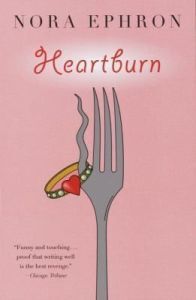
I’ve known about this book forever, as I’ve known about all Nora Ephron’s work in books and movies, though the only book of hers I’ve ever read is her last one, I Remember Nothing. I believe Heartburn was her first book,, later turned into a movie, and is a not-at-all-thinly veiled roman a clef about the breakup of her second marriage after she learned of her husband’s affair.
Ephron had a very specific voice that is present in this lightly fictional work as well as in her non-fiction — an stylized, ironic, sometimes snarky manner of writing that for me, takes a bit of getting used but definitely won me over. As was the case when I read her writing about her own early life in I Remember Nothing and often is the case when I read novels or memoirs about women who came of age in the 1960s, it feels jarring to remember how recent that time was, when such unrealistic expectations were placed on women and such limitations were put around what they were allowed to be and achieve. Not that all the battles are one, and it’s possible (as we have seen in many places and maybe are seeing now) for ground once gained to be lost again … but it really is powerful to be reminded that not long ago, in an era that for women of my age was our mothers’ youth, smart and ambitious women really were taught that marriage was their most important job and that they would never be the equal of men in the workplace. That was the main thing I took away from Heartburn — a glimpse into a world that, while chronologically not that far in the past, feels ancient to me now.
August 15, 2025
Death at the Sign of the Rook, by Kate Atkinson
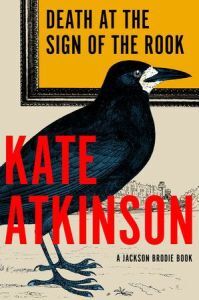
I read the first five Jackson Brodie mysteries back in 2019, and enjoyed them a lot, though by the end I was getting a little overdosed on Brodie’s world-weary cynicism and his inability to form and sustain meaningful relationships. I enjoyed the beautiful writing and the well-crafted mysteries, but I needed a break from the detective.
Maybe Atkinson did too, or maybe she was just busy with other stories. Anyway, Jackson Brodie is back, older and maybe wiser (still having difficulty maintaining relationships with women though, and still a little cynical) in this new mystery, which is an intricate puzzle-box of a story with a wildly misleading blurb.
If you read the book’s description, you will be given the impression that this story centres around a group of people who arrive at an English country house for a murder mystery game when a real murder occurs. This is a great premise, and it does happen in the book … but it happens at least 2/3 of the way through, maybe later. It’s really the climax of the story, which has been gradually building throughout the earlier chapters.
Unusually for Jackson Brodie, the mystery begins, not with a missing or murdered woman, but with an art theft, and a relatively low-stakes one at that — he’s not even sure it’s actually a theft. From there, various threads (and a wonderful cast of vividly developed characters) come together to create a mystery that is twisty, complicated, and hard to predict. I very much enjoyed reading this.
How to Survive a Bear Attack, by Claire Cameron
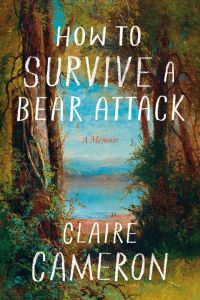
What an interesting book this is. The best essayists and memoirists have a great talent for taking two apparently unrelated subjects and using one to illuminate the other. In this case, it’s the lifelong fascination author Claire Cameron has had with a 1991 bear attack that killed two people in Algonquin Park, and her own midlife diagnosis of and treatment for the same cancer that killed her father when she was young.
In the wake of her diagnosis, Cameron (who has already written a novel inspired by the Algonquin Park bear attack), decides to take an even deeper dive than she’s done before into researching this event, while at the same time navigating her own relationship with the outdoors. Healing from the grief over her father’s death, she became, as a young person, very active in outdoor activities, particularly canoeing and backcountry camping. After her surgery for melanoma, she was told by a doctor that she should avoid exposure to almost all UV light … meaning that most of the activities she loved, the things that spelled healing and wholeness for her, were impossible. When she returns to Algonquin Park, it’s to pursue the seemingly unrelated question of why and how a black bear attacked and killed two campers all those years ago.
But of course, the two unrelated things are never really unrelated. This is an insightful book about black bears, a specific bear attack, backcountry camping, living with cancer, and grief. In other words, it’s a book about the fear of death and how we cope with it. If you learn everything about bears and bear attacks, can you protect yourself from an (incredibly rare) attack? If you avoid daylight, can you avoid a recurrence of your (also quite rare) deadly skin cancer? What does it mean to be “safe,” and how can we cope with the uncertainty that is an inevitable part of being human?
This book has received a lot of attention and acclaim, and that’s very well deserved. I found it fascinating.
The Griffin Sisters’ Greatest Hits, by Jennifer Weiner
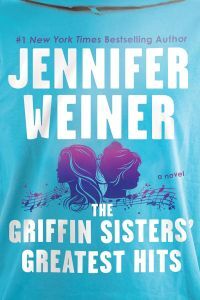
I know I’ve said this before, but Jennifer Weiner is just so reliable. When I pick up one of her novels I know what the tone will be, I know the type of story to expect, and I know that I will be satisfied at the end. Her latest novel did not disappoint. The Griffin Sisters’ Greatest Hits is about two sisters — the phenomenally talented but painfully shy-to-the-point-of-reclusive Cassie, and the beautiful, ambitious, but only minimally talented Zoe, who become a brief pop music sensation as a musical duo in the early 2000s. The band breaks up disastrously after one album and one tour. When the story opens, two decades later, Zoe is trying to live as quiet and low-key a life as possible as a suburban mom, and Cassie is … well, nobody knows where Cassie is. Not Zoe, and not the rabid fans who still adore her music and try to find out what happened to her. Throw in Zoe’s teenage daughter who’s also a talented musician, and you have the recipe for a story that unfolds in the present day as well as in flashback scenes from twenty years ago, leading to a final reckoning when both sisters have to face what happened to stop the music. I really enjoyed this book.
The Bright Sword, by Lev Grossman
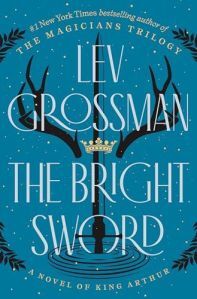
It’s been a long wait for a new novel by Lev Grossman, author of The Magicians trilogy, but The Bright Sword is certainly worth the wait. It’s hard for a writer to come up with a fresh take on the Arthurian legends, but Grossman has absolutely done it.
He begins with a young would-be knight named Collum who travels the length of England to the fabled court of Camelot to seek his fortune there. Unfortunately, he’s too late — he arrives to find the Round Table in disarray, King Arthur dead, Camelot fallen. The story is over — and yet the story is just beginning.
The novel alternates between flashback stories of the various remaining knights during Camelot’s glory days, and the tale of Collum and the ragtag band of leftovers who try to figure out what Britain after Arthur might look like. I found this tale magical, engrossing, and thought-provoking, with the ending being one of the most thought-provoking parts of all. How do we rebuild the world after the old order falls? It’s a question as relevant today as it was eight hundred years ago, or fifteen hundred, or whenever you particularly would like to situate your Arthurian legend.
This is something Grossman talks about in a really interesting and well-done afterword — how the Arthurian tales and myths have always functioned in English culture as material to be reimagined and reworked. How some writers have tried to situate them with great historical accuracy in the post-Roman Britain where the original legends were likely born, about the sixth century CE or thereabouts, while others have placed them in the high medieval setting from which some of the best-known sources for the stories spring. Grossman cheerfully admits to doing both, freely picking and choosing from different historical settings and embracing anachronisms. The central conflict that would have been true to the time of a historical Arthur, if there ever was one, is whether Britain would embrace Roman Christianity, or return to the indigenous religion of druids, and this is very much a central concern in The Bright Sword. But there are no simple answers, just a wonderfully twisty journey through the questions.
I read this right after Guy Gavriel Kay’s Written on the Dark, which I confidently assumed would be my favourite fantasy novel of the year — but honestly, this one might come out just slightly ahead.
August 14, 2025
Written on the Dark, by Guy Gavriel Kay
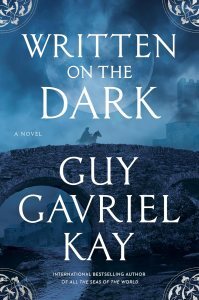
It’s always a happy happy day when Guy Gavriel Kay releases a new book. His latest novel, Written on the Dark, continues to expand about the nearly-our-world-but-not-quite history he’s been developing over many, many novels (if you consider it a series, even though it wasn’t specifically written as one, this cycle now contains eight novels, and I wrote about the experience of rereading the first seven at the end of this year-end post in 2023).
This time, we are in Ferrieres, a country that closely parallels France in our world, and a country that, like France in the 1300s, is locked in a hundred-years’-war with its neighbour. A king very like Henry V is about to invade, but that’s only the backdrop of the story. The foreground is the story of a young poet who unexpectedly gets jarred out of his quiet life and thrown into the world of much greater events and much more powerful people. This is Guy Gavriel Kay at his best — using a historical moment infused with just a light touch of fantasy and magic, to explore the differences that ordinary people can make in great moments. It’s haunting, evocative, and lovely (and gives an interesting twist to that world’s version of Joan of Arc, too!)
August 7, 2025
Detective Aunty, by Uzma Jalaluddin
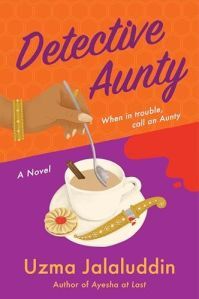
I’m a big fan of Uzma Jalaluddin’s romances (Ayesha at Last, Hana Khan Carries On, and Much Ado About Nada) and I’m just as delighted with her foray into mysteries. Like those three novels, Detective Aunty is firmly rooted in the Muslim immigrant community of Toronto, so has a strong sense of place and culture which makes even the minor characters feel like real people. Unlike those novels, which all focused on the typically young (20s and early 30s) people whose stories are the usual fodder for romance, this is the story of Kausar Khan, a recently widowed grandmother who has been — not estranged, but distant from her family, since a tragedy many years earlier caused her and her husband to move out of Toronto. Now she has been called back by a crisis — her daughter is a suspect in a murder, and Kausar not only wants to help out but to prove her daughter’s innocence.
As this book is subtitled “Kausar Khan Investigates #1” I am hopeful for lots more stories featuring this delightful main character and her world. I’ll follow Uzma Jalaluddin anywhere she wants to go in her novels, but I’m glad it’s into the world of (relatively) cozy mysteries!
Quiet Time, by Katherine Alexandra Harvey
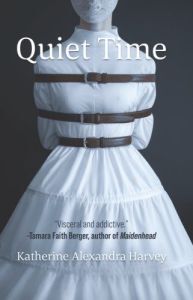
This coming-of-age story about a young adult’s struggle through abuse, addition, and mental illness is well-drawn and compelling to read. I definitely found myself caring about the main character and hoping she would manage to come through these experiences and find a sense of herself that would allow her to move forward. The novel really captures the claustrophobic feeling of being trapped in a life that doesn’t allow you space to become who you were meant to be.
If I have one quibble with the novel it’s that I found the way the setting was written a little hard to get a handle on — Harvey is a Newfoundland writer and at least one review of the book I read described it as being set here in Newfoundland, but apart from a reference to being on an island, I didn’t get any strong sense that it was here or anywhere else specifically. If I’d been told it was Cape Breton or PEI it would have been just as believable to me. Which is fine; I know some people like a “this could happen anywhere” kind of novel, but I feel that a strong sense of place adds so much to a story that I missed it in this one. However, I would still recommend it, though only for readers who don’t mind honest depictions of some of the harsher realities of life.
The Governor’s Rapture, by Paul Butler
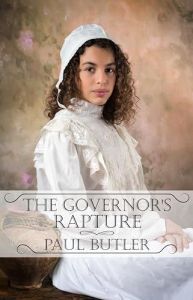
It’s always interesting to read a piece of Newfoundland-based historical fiction that touches on an era and experience I don’t know much about. The Governor’s Rapture spans a period of about four decades from the late 1700s to the early 1800s, beginning when Jessica George, a young Black woman who is a servant in the governor’s household, has an ill-fated affair with a young English soldier. The consequences of that affair unfold over the following decades, down to Jessica’s granddaughter Eliza, where the story takes an unexpected twist.
I really enjoyed this foray into an era of our history that doesn’t get represented a lot in historical fiction, and the experience of Black servants (who were small in number in our population, but not non-existent as some people claim!) in Newfoundland, adds an especially interesting layer to this story.
August 2, 2025
The Midnight Feast, by Lucy Foley
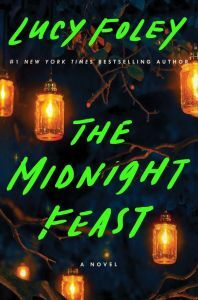
This was a quick read that I enjoyed while reading it although I don’t think it will linger with me long afterwards. It’s sort of a mystery novel, though it’s less about “who done it?” than about how a bunch of threads from the past come together to avenge a past wrong and create a present tragedy. It’s also very much a “rich people behaving badly” novel, with a wealthy couple having transformed an old manor house from the wife’s family into a resort for the super-wealthy. The opening weekend of extravagant, wildly wasteful celebration is to be crowned with a “midnight feast” of superlative excess. But between local people opposed to the new development, a woman who is out to get revenge for something that happened years ago, and several characters who turn out not to be quite who we think they are — well, by the time the inevitable murder happens, there’s a wide cast of suspects to choose from.



